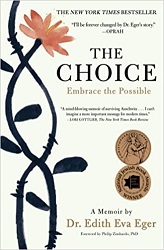
 The Choice
The ChoiceEmbrace the Possible
Review posted April 22, 2022.
Scribner, 2017. 288 pages.
Review written April 5, 2022, from a library book
Starred Review
2022 Sonderbooks Standout:
#4 General Nonfiction
This book was published five years ago, but it still has a long holds list at the library. In fact, I had to read it in two sections, because I'd been reading only a chapter at a time, and in the middle I had to return the book and put it on hold again.
The story is powerful, inspiring, and transformational. This book is a memoir by a Holocaust survivor -- but it also contains powerfully encouraging words about healing from trauma by a doctor of psychology.
Here's how Dr. Eger finishes the Introduction:
Whether you're in the dawn or noon or late evening of your life, whether you've seen deep suffering or are only just beginning to encounter struggle, whether you're falling in love for the first time or losing your life partner to old age, whether you're healing from a life-altering event or in search of some little adjustments that could bring more joy to your life, I would love to help you discover how to escape the concentration camp of your own mind and become the person you were meant to be. I would love to help you experience freedom from the past, freedom from failures and fears, freedom from anger and mistakes, freedom from regret and unresolved grief -- and the freedom to enjoy the full, rich feast of life. We cannot choose to have a life free of hurt. But we can choose to be free, to escape the past, no matter what befalls us, and to embrace the possible. I invite you to make the choice to be free.
Like the challah my mother used to make for our Friday night meal, this book has three strands: my story of survival, my story of healing myself, and the stories of the precious people I've had the privilege of guiding to freedom. I've conveyed my experience as I can best remember it. The stories about patients accurately reflect the core of these experiences, but I have changed all names and identifying details and in some instances created composites from patients working through similar challenges. What follows is the story of the choices, big and small, that can lead us from trauma to triumph, from darkness to light, from imprisonment to freedom.
You couldn't ask for a more dramatic story as an illustration than Dr. Eger's. We hear her heart-wrenching story during the Holocaust, and then she's honest about the difficulty it took her to heal from that trauma.
If she can heal from her trauma, then surely we can heal from ours.
Her message is consistent: "You can't change what happened, you can't change what you did or what was done to you. But you can choose how you live now."
Here's to choosing freedom! This book will help you do it.
